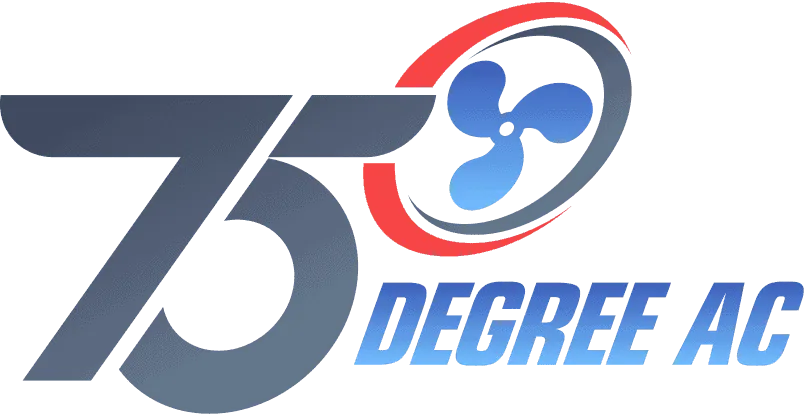Frequent cycling on and off in your AC unit, also known as AC short-cycling On and Off, can be a real headache, especially in the sweltering heat of Houston. This common problem not only disrupts the comfort of your home but also leads to significantly higher energy bills. The relentless Houston heat, coupled with high humidity, places enormous stress on your air conditioning system. When your AC unit is short cycling, it fails to complete an entire cooling cycle, resulting in inconsistent indoor temperatures and excessive wear and tear on your system.
Understanding the causes behind this frequent cycling and implementing preventative measures can help keep your home cool and your system running efficiently. In this comprehensive guide, we’ll explore why your AC unit might be cycling on and off rapidly, identify common causes, and provide actionable tips to prevent this issue. Whether it’s due to an oversized air conditioner, thermostat issues, refrigerant leaks, or electrical problems, we’ll help you navigate these challenges to maintain a comfortable and energy-efficient home in Houston.
Table of Contents
Understanding AC Short Cycling: What Is It?
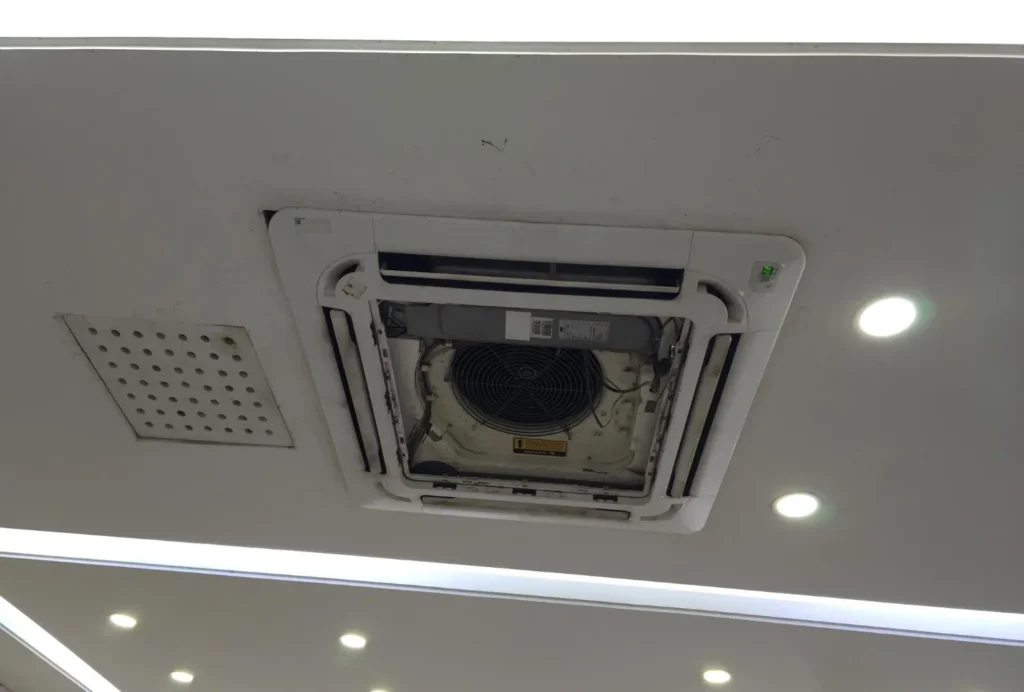
Short cycling is a term used to describe the frequent cycling on and off of an air conditioner. Instead of completing an entire cooling cycle, the AC unit turns on, runs for a short period, and then turns off again, only to restart shortly after that. This rapid cycling can lead to a host of issues, including increased wear and tear on the unit, higher energy consumption, and inefficient cooling.
Why Is Short Cycling a Problem?
Air conditioner short cycling affects more than just your comfort; it can lead to serious mechanical issues. The compressor, which is the heart of the AC unit, suffers the most. Constantly turning on and off wears out the compressor faster than usual. Plus, the air conditioner never runs long enough to dehumidify the air effectively, leading to a sticky, uncomfortable indoor environment.
Symptoms of Short Cycling
Recognizing short cycling early can save you from more significant problems down the road. Here are some signs to watch for:
- Frequent On and Off Cycling: Your AC unit turns on and off more than 4-6 times an hour.
- Inconsistent Temperatures: Your home never reaches the desired temperature.
- High Energy Bills: Unusually high energy bills can indicate your AC needs to be fixed.
- Increased Wear and Tear: Frequent cycling leads to more frequent repairs and a reduced lifespan of your unit.
Common Causes of Short Cycling
Understanding the causes of short cycling can help you address the issue more effectively. Here are some of the most common reasons why your AC might be short-cycling.
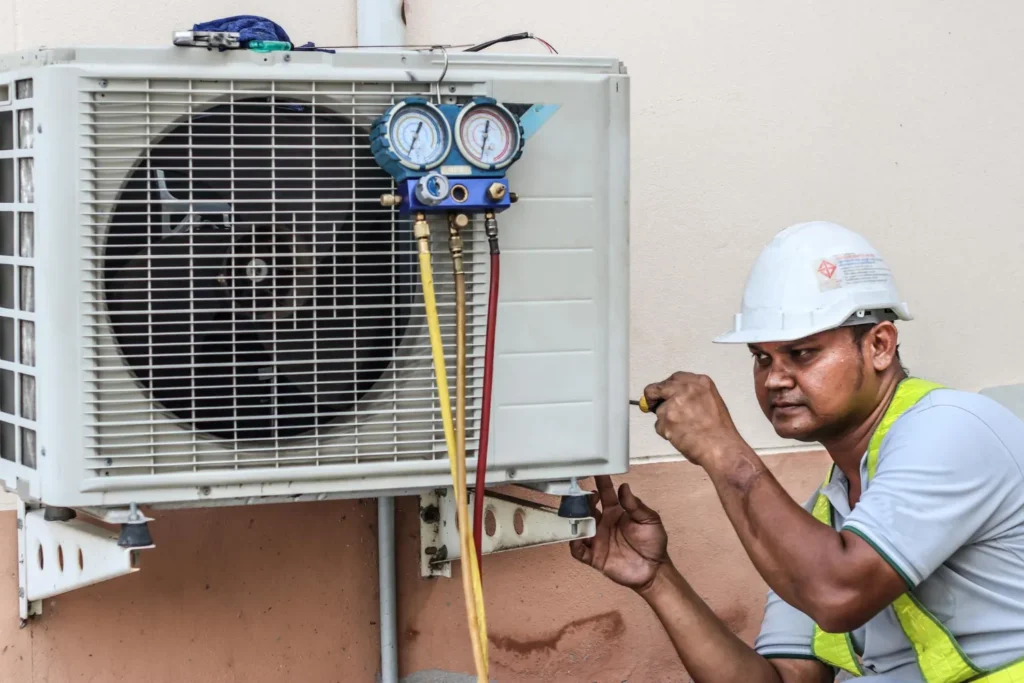
Oversized Air Conditioner
One of the most common causes of short cycling is an oversized air conditioner. When an AC unit is too large for the space it’s cooling, it cools the area too quickly and shuts off before completing an entire cycle. This rapid cooling doesn’t allow the unit to dehumidify the air properly, leading to a cold but clammy environment.
An oversized AC unit might seem like a good idea for cooling quickly. However, it doesn’t run long enough to remove humidity from the air. This results in an uncomfortable indoor climate and increases the frequency of on and off cycling. In Houston, where humidity is a significant concern, this issue can be particularly problematic.
Proactive Tip: Ensure that your air conditioning unit is appropriately sized for your home. A professional HVAC technician can help you conduct a load calculation to determine the correct size for your AC unit. This calculation considers various factors, including the size of your home, the number of windows, and the level of insulation, to recommend the right unit.
Thermostat Issues
A malfunctioning thermostat can cause your AC unit to short cycle. Suppose the thermostat is not calibrated correctly or is located too close to a heat source. In that case, it can give false readings, causing the unit to turn on and off rapidly. A smart thermostat can help manage this issue by providing more accurate temperature readings and better control.
The thermostat is the brain of your HVAC system. It senses the temperature and signals the AC unit to turn on and off accordingly. When it malfunctions, it can misread the indoor temperature, leading to frequent cycling. Common issues include poor placement (such as near windows, doors, or direct sunlight) and outdated or faulty devices.
Proactive Tip: Place the thermostat in a central location away from direct sunlight, windows, or doors to ensure it reads the indoor temperature accurately. If your thermostat is old, consider upgrading to a smart thermostat. These devices offer more precise control and can learn your schedule, adjusting the temperature to save energy and reduce wear and tear on your AC unit.
Refrigerant Leaks
Low refrigerant levels due to leaks can cause the AC unit to short cycle. When there’s not enough refrigerant, the system can’t complete an entire cycle, leading to rapid cycling. Refrigerant leaks not only affect cooling but can also damage the compressor if not addressed promptly.
Refrigerant is the lifeblood of your air conditioner. It absorbs heat from the indoor air and releases it outside. When the refrigerant level is low, the system cannot effectively remove heat from your home, causing it to cycle on and off frequently. This problem is often accompanied by hissing sounds from the AC unit and a noticeable decline in cooling performance.
Proactive Tip: Regularly check your AC system for signs of refrigerant leaks, such as oily spots on the unit or hissing noises. If you suspect a leak, contact a licensed HVAC technician immediately to inspect and repair the system. Proper maintenance and timely repairs can prevent refrigerant leaks and ensure efficient cooling.
Clogged Air Filters
Dirty or clogged air filters restrict airflow, causing the AC unit to overheat and shut off prematurely. This overheating triggers the unit to turn on and off frequently, preventing it from maintaining a consistent temperature.
Air filters play a crucial role in maintaining indoor air quality and ensuring efficient airflow. When filters become clogged with dust, dirt, and debris, they restrict the system’s airflow. This restriction causes the unit to work harder to cool your home, leading to overheating and short cycling.
Proactive Tip: Replace or clean air filters regularly, ideally every 1-3 months, depending on the type of filter and the level of indoor air pollution. In Houston’s humid climate, where AC units run almost year-round, more frequent filter changes may be necessary to maintain optimal airflow and prevent short cycling.
Electrical Problems
Electrical issues such as faulty wiring, a malfunctioning run capacitor, or loose electrical connections can lead to short cycling. These problems interfere with the continuous power supply needed for the AC unit to complete its cooling cycle.
The electrical components of an AC unit are essential for its operation. Any disruption in the electrical supply, whether due to faulty wiring, a failing capacitor, or loose connections, can cause the unit to short cycle. This not only affects performance but can also pose a safety hazard.
Proactive Tip: Have your AC unit’s electrical system inspected regularly by a qualified HVAC technician. They can check for and repair any faulty wiring, replace failing capacitors, and ensure all electrical connections are secure. Regular electrical maintenance helps prevent short cycling and extends the lifespan of your unit.
Blocked Condenser Coils
Condenser coils that are dirty or blocked with debris can cause the AC unit to overheat and short cycle. The coils need to be clean to dissipate heat effectively. When they’re blocked, the unit works harder, leading to frequent cycling.
The condenser coils, located in the outdoor unit, play a vital role in releasing the heat absorbed from your home. When these coils are covered with dirt, leaves, or other debris, they cannot perform efficiently, causing the system to overheat and short cycle.
Proactive Tip: Regularly inspect and clean the condenser coils to ensure they are free from dirt and debris. Maintain a clear area around the outdoor unit to allow for proper airflow. You can use a garden hose to wash away dirt from the coils gently, but be careful not to damage the delicate fins.
Frozen Evaporator Coils
When the evaporator coils freeze, the AC unit can short cycle. This freezing typically happens due to restricted airflow or low refrigerant levels. As the ice builds up, it restricts the airflow further, causing the system to shut down prematurely.
The evaporator coils absorb heat from the indoor air. When they freeze, they cannot perform their function effectively, leading to rapid on-and-off cycling of the AC unit. Symptoms of frozen coils include visible ice on the unit and a lack of cool air from the vents.
Proactive Tip: Ensure proper airflow by keeping air filters clean and checking for any obstructions in the ductwork. If you notice ice buildup, turn off the AC unit and let the ice thaw completely before restarting it. Regular maintenance by a professional can help prevent frozen coils and keep your system running smoothly.
Preventative Tips to Avoid Short Cycling On and Off
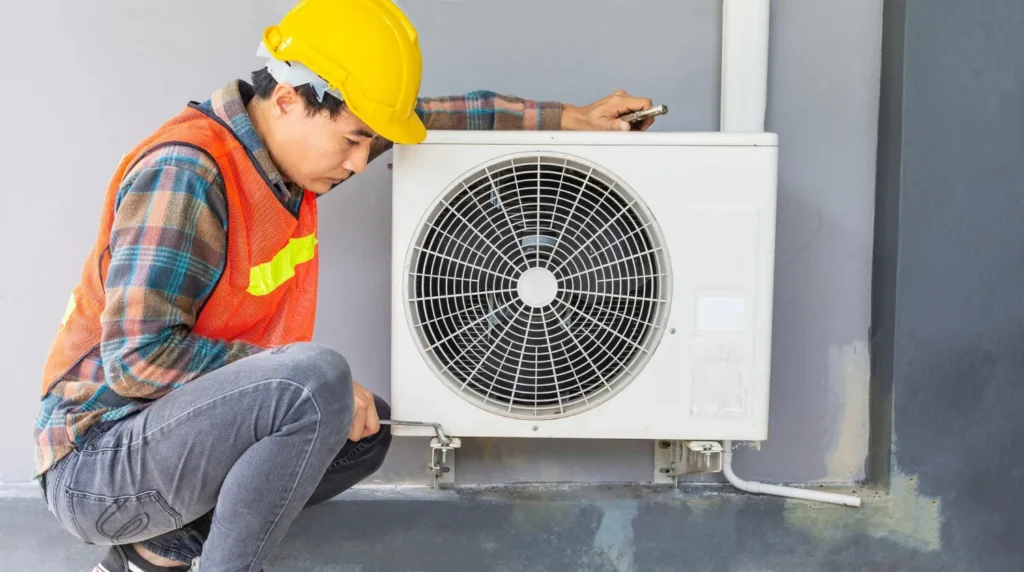
Preventing short cycling involves regular maintenance and proactive measures to ensure your AC unit operates efficiently. Here are some tips to keep your system running smoothly and avoid the problems associated with frequent cycling.
Regular Maintenance
Regular maintenance is crucial for the longevity and efficiency of your AC unit. Schedule annual check-ups with a professional HVAC technician to inspect and service your system. During these check-ups, the technician can identify and address potential issues before they become significant problems, such as checking refrigerant levels, cleaning coils, and ensuring all components are in good working condition.
Proper Sizing and Installation
Ensure that your AC unit is properly sized and installed for your home. An oversized or undersized unit can lead to short cycling and inefficiency. Consult with a professional HVAC technician to perform a load calculation and recommend the appropriate unit size for your home.
Upgrade to a Smart Thermostat
Consider upgrading to a smart thermostat for better temperature control and energy efficiency. Smart thermostats can learn your schedule, adjust temperatures automatically, and provide more accurate readings. This helps prevent short cycling by maintaining consistent indoor temperatures.
Keep Air Filters Clean
Replace or clean air filters regularly to ensure proper airflow. Dirty filters can restrict airflow and cause the unit to overheat and short cycle. Check filters monthly and replace them as needed, especially during peak usage times in Houston’s hot and humid climate.
Inspect and Clean Coils
Keep both the evaporator and condenser coils clean to ensure efficient heat exchange. Dirty coils can cause the system to overheat and short cycle. Regularly inspect and clean the coils to prevent dirt and debris buildup.
Check for Refrigerant Leaks
Regularly check for refrigerant leaks and ensure proper refrigerant levels. Low refrigerant levels can cause the system to short cycle and reduce cooling efficiency. If you suspect a leak, contact a professional HVAC technician to inspect and repair the system.
Ensure Proper Airflow
Ensure proper airflow by keeping vents and registers clear of obstructions. Blocked vents can restrict airflow and cause the system to overheat and short cycle. Regularly check and clean vents to maintain optimal airflow.
Regular Electrical Inspections
Have your AC unit’s electrical system inspected regularly by a qualified technician. Electrical problems such as faulty wiring, failing capacitors, and loose connections can cause short cycling. Regular electrical maintenance helps prevent these issues and ensures safe and efficient operation.
Choosing the Right HVAC Professional in Houston
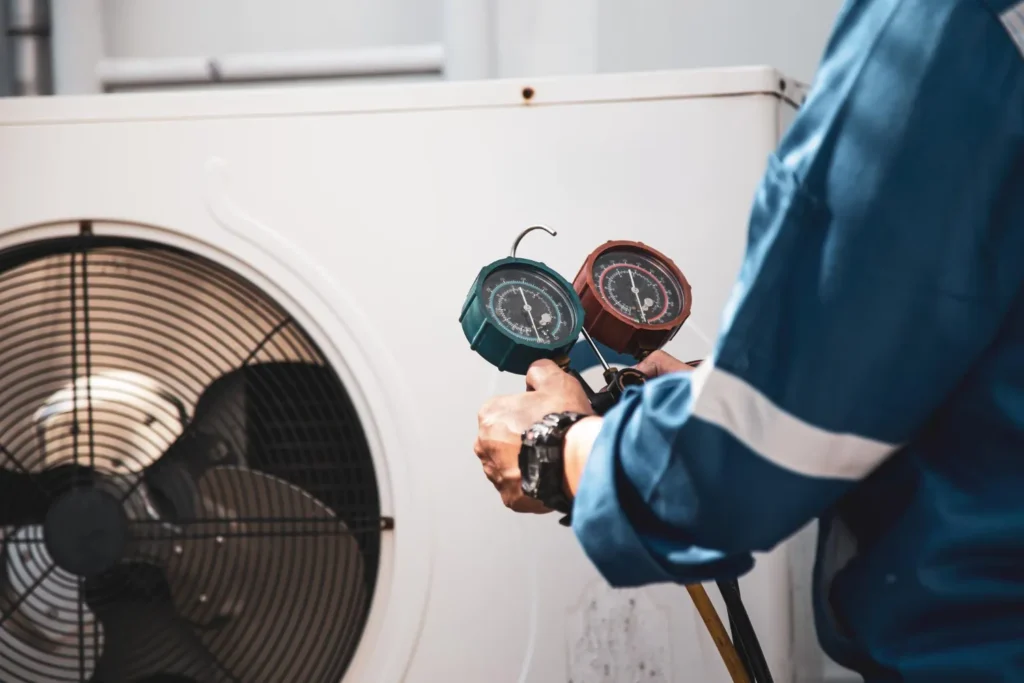
When dealing with short cycling issues, it’s essential to choose the right HVAC professional to service your AC unit. Here are some tips to help you find a reliable and experienced HVAC technician in Houston.
Check Credentials and Experience
Ensure that the HVAC technician is licensed and experienced in dealing with AC systems. Look for certifications from recognized organizations, such as NATE (North American Technician Excellence) or ACCA (Air Conditioning Contractors of America).
Read Reviews and Testimonials
Look for reviews and testimonials from previous customers to gauge the HVAC company’s reputation. Positive feedback indicates reliable and quality service. Check online review sites like Google, Yelp, and Angie’s List for customer reviews.
Ask About Services and Costs
Please inquire about the services offered and their costs. A transparent pricing structure and comprehensive services indicate a trustworthy professional. Ensure that the company provides detailed estimates and explanations of the work to be done.
Request References
Ask for references from past clients. Speaking with previous customers can provide insights into the technician’s reliability and quality of work. References can share their personal experiences and satisfaction with the service provided.
Verify Insurance and Guarantees
Ensure that the HVAC professional has insurance and offers guarantees on their work. This protects you from potential liabilities and ensures quality service. Insurance covers any damages or accidents that may occur during the job, providing peace of mind.
Conclusion
Frequent cycling on and off in your AC unit, also known as short cycling, can be a significant issue in the hot and humid climate of Houston. Understanding the causes of short cycling and taking preventative measures can help you maintain your system’s efficiency and prolong its lifespan. Regular maintenance, proper sizing and installation, and addressing potential issues promptly are crucial to preventing short cycling and ensuring your home stays relaxed and comfortable.
FAQs on Frequent Cycling On and Off in Your AC Unit in Houston
Why does my AC cycle on and off so much?
Your AC unit may cycle on and off frequently due to various issues such as an oversized air conditioner, thermostat malfunctions, refrigerant leaks, or clogged air filters. These problems prevent the unit from completing an entire cooling cycle, leading to short cycling.
How do I stop my air conditioner from short cycling?
To prevent your air conditioner from short-circuiting, ensure your AC unit is properly sized for your home, clean or replace air filters regularly, check for refrigerant leaks, and ensure the thermostat is functioning correctly. Regular maintenance by a professional HVAC technician can also help prevent short-circuiting.
What causes short cycling in AC units?
Common causes of short cycling in AC units include oversized air conditioners, malfunctioning thermostats, low refrigerant levels due to leaks, clogged air filters, electrical issues, and blocked condenser or evaporator coils.
How to prevent short cycling in AC units?
Prevent short cycling by ensuring your AC unit is correctly sized, maintaining clean air filters, regularly inspecting and cleaning the condenser and evaporator coils, checking for refrigerant leaks, and keeping the thermostat calibrated and well-placed.
What are the signs of short cycling in AC units?
Signs of short cycling include frequent on and off cycling (more than 4-6 times per hour), inconsistent indoor temperatures, unusually high energy bills, and increased wear and tear on the AC unit, leading to more frequent repairs.
How to fix short cycling in AC units?
Fix short cycling by addressing the root causes: properly sizing the AC unit, replacing or cleaning air filters, repairing refrigerant leaks, ensuring precise airflow around the condenser and evaporator coils, and fixing any electrical issues. Consulting with a professional HVAC technician can ensure thorough diagnostics and repair.
How does short cycling affect an AC?
Short cycling can lead to increased wear and tear on the AC unit, reduced efficiency, higher energy bills, and a shorter lifespan overall. It also prevents the unit from adequately dehumidifying the air, leading to an uncomfortable indoor environment.
Will low refrigerant cause short cycling?
Yes, low refrigerant levels can cause short cycling. When the refrigerant is low, the AC unit struggles to complete an entire cooling cycle, leading to rapid cycling on and off.
How do I know if my AC is short cycling?
You can tell if your AC is short cycling if it frequently turns on and off within short intervals, the indoor temperature is inconsistent. You notice a spike in your energy bills. Additionally, increased wear and tear on the unit and more frequent need for repairs can indicate short cycling.
Should I turn off my AC if it’s short cycling?
Yes, if your AC is short-cycling, it’s advisable to turn it off and contact a professional HVAC technician. Continuing to run the unit can cause further damage and increase repair costs.
